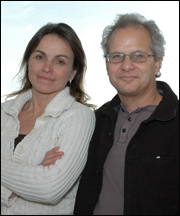
The typical visiting fellow at Notre Dames Kellogg Institute for International Studies is a scholar, says interim director Edward N. Beatty. But now and again, someone outside the academy can make an unmatchable contribution.
This semester, visiting fellows Gary Marx, former Havana bureau chief for the Chicago Tribune, and his wifefreelance journalist Cecilia Vaismanare teaching a course on contemporary Cuba. The couple and their children, 11-year-old Ana and 9-year-old Andres, recently returned to the U.S. after living in Cuba for five years.
The couple brings something special to campus, Beatty says.
Their on-the-ground experience, reporting the nitty-gritty of political and social change, combined with their willingness to lay their experience out on the table with students,he said.The students feel very free to ask questions.
The most common question Marx was asked, before Cuban President Fidel Castro publicly turned over leadership? Whether Castro was alive or dead?
His answer?Hes alive. Its not something they could hide for long.
People also are wondering what will happen as Castro steps down from leadership, ceding power to his brother and handpicked successor Raul Castro.
Raul is very capable,Marx said.But hes a transitional figure. Hes 76 years old. He may ease restrictions on travel. Therell be some modest economic reforms, modest political reforms.
The real question, Marx says, is what will happen when Raul Castro steps down or dies.
Cuba, Vaisman notes, is a beautiful tropical country.
We spent a lot of time going down to the beach with our kids,she said.
Their children attended a local Cuban school, and the family shopped alongside Cubans in the agro-markets, where farmers sell fresh fruitmangoes and papayasand vegetables.
But students who see pictures of their life in Cuba are astonished at the level of poverty on the island.
Theres no consumer economy,Vaisman said.No car dealerships, no Wal-Mart.
Vaisman spent most of her time engaged inwhat the Cubans call resolviendo and conseguindoresolving and finding,she said.Those are no simple matters in Cuba.
Finding something as simple as childrens ibuprofen or a lamb for Christmas dinner could take days.
It took me a while to find out that it was illegal to buy a potato on the open market,she said.Theyre controlled on the state ration card system. But it didnt take long to figure out how to get a potato on the black market. Buying on the black market is standard operating procedure for everyone on the island.
They lived under the constant pressure of a police state.
There was a sense that we were always being watched and listened to,Marx said.We assumed that our employees were informants for the government. We assumed that our house was bugged. There was a sense that no conversation was private. It was difficult to work as a reporter, or to make friends.
Early on, Marx profiled a well-known dissident in the Tribuneonly to find out a few weeks later that he was a government agent.
You cant take anybody at face value,he said.
Their five-year stay on the island ended abruptly.
They called me in and said they were not going to renew my press credentialsthey felt my coverage was negative,Marx said.They didnt want to engage in debate. My time was up. I could no longer report from the island.
During their fellowship, Marx and Vaisman are working on a book on their years in Cuba, weaving in the history of Cuba and current political events with their own experiences. Vaisman also is working on a documentary film.
It was an incredibly difficult place to work,Marx said.But for a journalist, it was the ultimate challenge. Im grateful I had the chance to live and work there.
The Kellogg Institute also is grateful for the opportunity to bring the couples experience and expertise to campus, says Beatty.
Its an example of the way Kellogg enriches the entire University community,he said.It helps make our little world more interesting.
TopicID: 26946